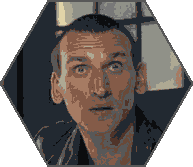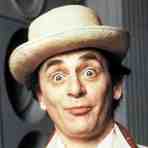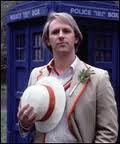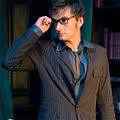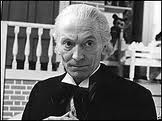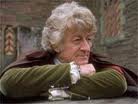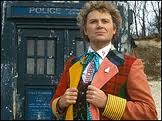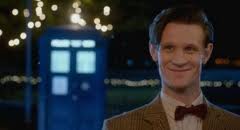It would seem a bit off to let the 50th Anniversary of Dr Who pass, without throwing my tuppence into the arena. I also realise that this is a touchy subject; everyone has their own ‘my Doctor’ and the argument as to which incarnation of the Time Lord is the best is one that tends to get Geeky eyebrows and voices raised. I daresay it’ll continue long after that much-dreaded 12th regeneration, but I’m going to nail my sonic-screwdriver to the mast and take a stance.
The only way I can do this is on a list and, like the polarity of the neutron flow, I’m going to do it in reverse. As I write this, I can feel myself getting a bit nervous; I’ve had my theories over the years, but been careful not to broadcast them too loudly. Deep breath and here we go:
The Worst to Best Doctors Who
11. Christopher Eccleston: 9th Doctor. New Who fans are going to hate me for this one but, for my money, the 9th Doctor was the least convincing of the lot. Don’t get me wrong; when I heard Who was going to be resurrected, I was as excited as anyone else. And then Eccleston turned up and that excitement was instantly exterminated.
My reasons for sticking him last were perfectly summed up by Terry Wogan who, on reviewing an episode said that he thought that the Doctor was supposed to be “the eccentric voice of wisdom and not a psychotic bin-man.” Which kind of nailed it for me. All the rage and grief that the 9th Doctor was spewing has only really been referenced in retrospect and everyone has very generously said ‘oh, it’s because he’d just finished the Time War and was shell-shocked’ or something. Personally, I think it was down to a bad character-choice on the actor’s part; he’d already said that he was never able to relate to former Doctors, finding them “too foppish”; his desire was to create a Doctor for the working classes. Fair enough, if you’re doing an Earth-bound drama – but he’s an alien. Which leads me to my next whinge:
The accent. Just, no. Any actor who has to have lines written into the script to excuse the fact that he either won’t or can’t use another accent simply isn’t doing his job. Every planet has a North? So, are we expected to believe that all Northern Gallifreyans speak like they’re from Manchester? I’ve nothing against the accent on a human-being, but an alien using it as his native dialect isn’t on. It’s lazy and, in my opinion, disrespectful to the show. And the costume? No. And the stiff-necked grin when Eccleston had to reach down into his boots to drag up the approximation of happiness? No. Fantastic? No.
10. Sylvester McCoy – the 7th Doctor. It’s really hard to gauge what McCoy did, because the show was a disaster at the time. Even the disco-style theme-tune was enough to make me do what I never thought I would and turn it off. The writing was bad, there was a queue of z-list celebrities waiting to go on it and the monsters were rubbish. And poor old Sylvester had all that to deal with. And he tried, bless him.
He started out badly enough, playing spoons and appearing to be some sort of intergalactic jester. By the time someone realised that a dose of darkness might sort things out, for me, it was too late. There was nothing Lordly about this Doctor. However, when it came to the movie, in which he appeared to pass the torch onto Paul McGann, we got a glimpse of what could’ve been: the spluttering twit had been replaced by a reflective, pottering Gallifreyan with a fierce intelligence. But he did go and pull his trademark gurning face in the regeneration scene, which did annoy me.
9. Paul McGann – the 8th Doctor. Tough one to judge, because we didn’t see enough of him and I haven’t listened to any of his Big Finish audio adventures. But, at face value, this Doctor was a bit too much of the romantic hero for me; less a cosmic wanderer who’d soaked up the wisdom and knowledge of new and ancient civilizations and more of a frustrated poet. But, I’d like to see him pop up at some point, so we can get a better idea of what he had to offer.
8. Peter Davison – the 5th Doctor. Another tough one to judge because, in retrospect, I actually quite liked what he did with the character; the air of reckless innocence, the moments of sombreness and the feeling that he was an old being caught in a young body. But the show was too slick at the time; too full of glossy production values that somehow elbowed out the Gothic atmosphere that I’d come to expect from Who. Not Davison’s fault at all – but the Doctor had also become the leader of some sort of interstellar crèche, with Adric, Tegan and Nyssa all squabbling and bubbling in the background. If I’d been the Doctor, I’d have dropped them all off, just to get some peace and quiet. And I didn’t mind his costume.
7. David Tennant – the 10th Doctor. Sacrilege, I know! And, believe me, he was such a welcome relief after Ecclestone’s moody posturing. I really liked Tennant’s Doctor to begin with but, after a while, he became a bit of a one-trick pony: goggle-eyed on minute and bemoaning his loneliness the next. But what he did bring back to the show was a sense of humour and the wonder that the Doctor had been missing for a good few incarnations. This Doctor was charming and buoyant, but I got fed up with the idea that he was some sort of Christ-like figure.
6. William Hartnell – the 1st Doctor. More blasphemy but, to be honest, I haven’t seen enough of this Doctor to form a concrete opinion. What I have seen has been interesting: the cranky old man, both treacherous and generous; the time-traveller who might tear a strip off you for his own selfish reasons and then ask forgiveness later on. Let’s face it; he must’ve been good or the show wouldn’t have survived to go another round. And certainly there was a lot of the Lord to this Time Lord – but he was a bit before my time and not as approachable as I like my Doctors to be.
5. Jon Pertwee – the 3rd Doctor. I can feel the hate coming at me already. Pertwee was my first Doctor and I had a strong fondness for him. But he wasn’t an alien to me; he was a dashing, swashbuckling professor in velvet. Certainly, he had the Lordly thing in spades, full of grace, poise and that quintessential Englishness that I think is integral to the Doctor’s character. Yet there wasn’t anything alien or that mysterious about him; he was too human. Authoritarian: yes. Sometimes conceited: yes. But alien? Not much. He wasn’t helped by the fact that most of his adventures were Earth-based thanks to those pesky Time Lords meddling with the TARDIS, but Pertwee’s Doctor felt more like something out of an HG Wells novel, than someone from outer space.
4. Colin Baker – the 6th Doctor. OK…hear me out… I think this Doctor is one of the most underrated in Who history. Baker was an out-and-out Who fan and came to the board with some really interesting ideas. He wanted his Doctor to be pompous, brash, arrogant and filled with his own sense of self-importance. Which, after charging around the universe and saving civilizations by the dozen, seems fair enough to me. I liked the way he swaggered about, looking down his nose at other races; you got a real sense that he was from an advanced society. I also liked the way his temper gave way to bouts of brattishness; this is a guy who’s been his own boss for centuries and not getting your own way must be a real grind if you’ve been used to it for that long.
And, I didn’t mind the costume. I know Baker wanted it to be black to reflect his darker interpretation, but it seemed fitting to me: a sort of preening, intergalactic peacock.
3. Patrick Troughton – the 2nd Doctor. The cosmic hobo. I really liked him. After the Victorian rule of the 1st Doctor, Troughton brought a sense of a character was really existing outside of Time itself. From his mop top to his crumpled frock-coat, he seemed to be everything that the 1st Doctor had been trying to keep a lid on. But Troughton could also play dark; with that craggy face and those burning, baggy eyes, he brought a sense of the unpredictable and danger to the Doctor. On top of that, he also brought a sense of approachability and safety; you just knew that he’d get you out of a scrape, but his rescue would be so last-minute and disorganised that you’d get the full benefit of the adventure before he did.
2. Matt Smith – the 11th Doctor. “What?” we all cried. “He’s 27?” But Smith has brought something special to the role – elements of Classic Who Doctors and New Who energy. Described by Moffat as a “beautiful giraffe”, he’s gangly, uncoordinated, but with a peculiar grace to him. Plus he’s got the alien thing down to a T: he looks odd, like there’s an old man trying to get out of a young body and it reflects in his performance. He gabbles as though there’s too much information in his head for his mouth to cope with, grins with disarming confidence, but you always get the feeling that there’s something else going on inside that 1,000 year-old bonce. This Doctor is complex and sometimes irritating, but he’s a Gallifreyan, through and through.
- Tom Baker – the 4th Doctor. Of course it is. My sadness at losing Pertwee to a race of giant spiders was quickly replaced by an obsessive need to see what this marble-eyed lunatic was going to get up to next. Tom Baker was the Doctor, from his sonorous drawl to his toothy grin. He really looked like he’d been booted out from an elitist society and was having to get by in his own haphazard fashion. The TARDIS was his gypsy wagon and he was like a disgraced Oxford professor having to make up his own rules as he went along. He really was a rootless traveller.
The early part of Tom’s incarnation presented us with the childish, wide-eyed aspect of his character, but this soon gave way to the darker, more serious parts. This was the Doctor you wanted to hang out with, but were never quite sure of what he’d do next. And he got the alien thing going from the start. In fact, I’d go as far as to say that Tom was the first to put the alien imprint on the Doctor; his predecessors had all played aspects of a character, but there was little to tie them to an extra-terrestrial race. And it might be why Who started to flounder after Tom left: he gave us everything we wanted from a Time Lord – humour, seriousness, intelligence, wonder, a slightly skewed moral compass and a sense of being different from everyone around him. Unfortunately, for everyone who came after, it meant that the moment they tried to play the alien aspect, it just looked like a Tom impression. And no-one does alien like Tom Baker.
For me, Baker’s Doctor was The Doctor – often impersonated, but never rivalled. And, if you’ve never seen him in action, my recommendations are: Genesis of the Daleks, Brain of Morbius, Deadly Assassin or the Talons of Weng Chiang.
My hat (and scarf) are firmly in the ring. Tell me how wrong I am; I dare you.

